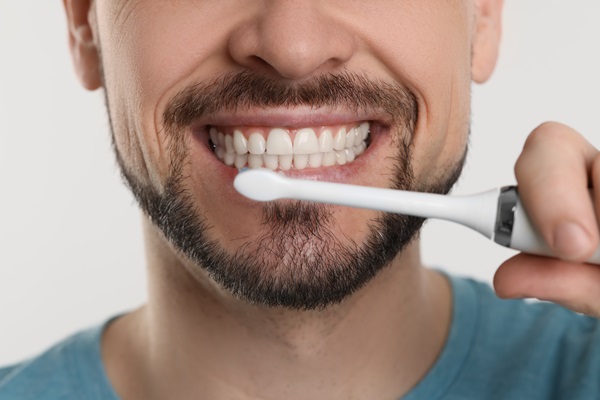Preventive Dentistry: Choosing the Right Toothbrush

Using the right toothbrush is part of preventive dentistry. Your dental health is more secure if you have the right tool for cleaning your teeth and gums. An effective toothbrush can help you reach your dental health goals. If you want to know the basics of choosing the right toothbrush as part of preventive dentistry, here are the details.
The bristles
Toothbrushes can have hard, medium, and soft bristles. The tips may be unrounded or rounded. Many people think of toothbrushes with hard bristles as the most effective cleaners. In truth, these bristles can clean too hard. Handling this type of toothbrush with excessive pressure can damage the teeth. These toothbrushes can also recede and irritate the gums.
The goal of preventive dentistry and the humble toothbrush is to remove plaque. Even so, brushing must not take much force to get the job done. Most people use toothbrushes with soft, rounded bristles instead. Studies show how soft-bristled toothbrushes are the most optimal at cleaning teeth. The user must take a more relaxed route in using this type of toothbrush.
The shape and size of the toothbrush
Preventive dentistry understands the difference in each person’s mouth. The toothbrush must fit well inside the mouth. A toothbrush will not reach the back of the mouth if its head is too big. The back of the mouth and the back teeth are the favorite hiding places of bacteria.
Many individuals choose a toothbrush with a half-inch wide and one-inch long head. This is easy to maneuver and comfortable. Choosing this type of brush head with a good handle is ideal. The handle should not slip and slide in the hand.
The mechanism
Manual and electric toothbrushes can both clean teeth well. Preventive dentistry does not favor one over the other. Yet, some people choose electric toothbrushes because these tools are easy to use. An advantage of these toothbrushes is the two-minute timer. Using electric toothbrushes ensures thorough cleaning.
Some people are not comfortable with how an electric toothbrush feels inside the mouth. Others are too ticklish. Choosing which toothbrush works for the individual is a personal decision. Manual or electric, it is up to the user. Preventive dentistry works with the help of either type of toothbrush.
Replacing the toothbrush
Preventive dentistry professionals recommend replacing a toothbrush every three to four months. Bristles need to be upright to clean well. Brush heads need replacing once the bristles are out of shape or worn. These bristles may damage teeth if the brush head does not have a replacement soon. Replacing a toothbrush after an illness is ideal. This will make sure the person will not get sick from the same virus or bacteria again.
Preventive dentistry becomes efficient and effective with the right toothbrush
Choosing the correct type of toothbrush for your needs is important in preventive dentistry. You can perform preventive dentistry practices at home with a cleaning tool you are comfortable with. Flossing and using an effective toothbrush will help you reach your dental goals. Regular appointments with your dentist will reinforce your preventive dentistry practices.
Are you considering having a preventive dentistry procedure in the West Orange area? Get more information at https://www.newarkorangeemergencydentist.com.
Check out what others are saying about our dental services on Yelp: Preventative Dental Care in West Orange, NJ.
Related Posts
Did your general dentist recommend root canal therapy? You may need a root canal, which is a technical dental procedure that is done to correct and restore oral health. In this article, we will take a look at what root canals are and why your dentist may have recommended one.A root canal may be necessary…
Sore spots in your mouth may be a sign that it is time for denture adjustments. Sores on your gums should not be an expected part of wearing dentures. In fact, the sores may indicate that your dentures are damaged or do not fit properly. Sore spots are not only uncomfortable, but they can also…
A porcelain crown is a versatile dental restoration that protects and preserves damaged, weakened, or decayed natural teeth. By encasing the visible portion of a tooth, a porcelain crown restores its function, strength, and appearance. This treatment effectively saves a natural tooth from further damage, ensuring long-term oral health and maintaining the aesthetics of your…
Are you looking into your teeth straightening options? Orthodontics is a popular part of the dental arena, as straight teeth are desirable. Not only because straight teeth make for a pleasant-looking smile, but it is also important for teeth to be in their correct positions in order to support good oral health. Choosing a general…
